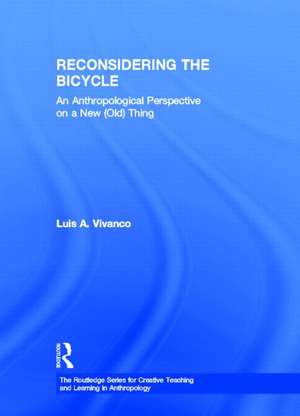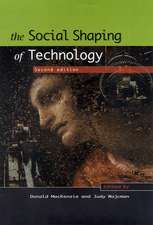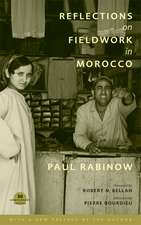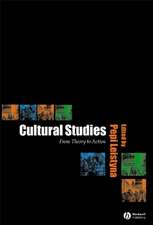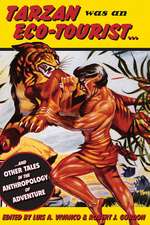Reconsidering the Bicycle: An Anthropological Perspective on a New (Old) Thing: Routledge Series for Creative Teaching and Learning in Anthropology
Autor Luis Vivancoen Limba Engleză Hardback – 14 feb 2013
This book explores how and why people are reconsidering the bicycle, no longer thinking of it simply as a toy or exercise machine, but as a potential solution to a number of contemporary problems. It focuses in particular on what reconsidering the bicycle might mean for everyday practices and politics of urban mobility, a concept that refers to the intertwined physical, technological, social, and experiential dimensions of human movement.
This book is for Introductory Anthropology, Cultural Anthropology, Cultural Sociology, Environmental Anthropology, and all undergraduate courses on the environment and on sustainability throughout the social sciences.
| Toate formatele și edițiile | Preț | Express |
|---|---|---|
| Paperback (1) | 351.66 lei 6-8 săpt. | |
| Taylor & Francis – 14 feb 2013 | 351.66 lei 6-8 săpt. | |
| Hardback (1) | 1110.81 lei 6-8 săpt. | |
| Taylor & Francis – 14 feb 2013 | 1110.81 lei 6-8 săpt. |
Preț: 1110.81 lei
Preț vechi: 1354.65 lei
-18% Nou
Puncte Express: 1666
Preț estimativ în valută:
212.65€ • 218.82$ • 179.25£
212.65€ • 218.82$ • 179.25£
Carte tipărită la comandă
Livrare economică 01-15 martie
Preluare comenzi: 021 569.72.76
Specificații
ISBN-13: 9780415503884
ISBN-10: 0415503884
Pagini: 178
Ilustrații: 9 tables and Following Fake Stuff
Dimensiuni: 178 x 254 x 15 mm
Greutate: 0.5 kg
Ediția:New.
Editura: Taylor & Francis
Colecția Routledge
Seria Routledge Series for Creative Teaching and Learning in Anthropology
Locul publicării:Oxford, United Kingdom
ISBN-10: 0415503884
Pagini: 178
Ilustrații: 9 tables and Following Fake Stuff
Dimensiuni: 178 x 254 x 15 mm
Greutate: 0.5 kg
Ediția:New.
Editura: Taylor & Francis
Colecția Routledge
Seria Routledge Series for Creative Teaching and Learning in Anthropology
Locul publicării:Oxford, United Kingdom
Cuprins
Preface: The Bicycle, A New (Old) Thing Acknowledgements 1. Anthropology, Bicycles, and Urban Mobility 2. What (and When) is a Bicycle? 3. Constructing Urban Bicycle Cultures: Perspectives on Three Cities 4. "Good for the Cause:" The Bike Movement as Social Action and Cultural Politics 5. Conclusion: On the Need for the Bicycle
Notă biografică
Luis A. Vivanco is Associate Professor of Anthropology and Director of Global and Regional Studies at the University of Vermont.
Recenzii
A vivid, ethnographically and historically rich contribution to transportation studies and the study of commodities. The bicycle emerges as one of the most fascinating and unexpectedly important objects of our world.
- Catherine Lutz, Watson Institute for International Studies, Brown University
With care and clarity, Luis Vivanco draws upon intensive fieldwork and meticulous research to produce a rich cultural analysis of the bicycle and the complex ways in which bicycling is made meaningful. Reconsidering the Bicycle not only carves new terrain for the study of bicycles as material culture, it effectively grapples with the socioeconomic, symbolic, personal, and political dimensions of bicycling in everyday life. Beyond its unique contribution to and expansion of existing work on urban cycling, Vivanco's engaging book demonstrates how and why anthropology and ethnographic inquiry should play central roles in the future of transportation research. Highly recommended."
-Zack Furness, author of One Less Car: Bicycling and the Politics of Automobility, Communications, Penn State University
Reconsidering the Bicycle gives an urgently needed critical context to the recent explosition of bicycle cultures in the United States and emphasizes the important distinction between passing cultural fads and the more durable social change brought about by bicycle mobility. To achieve this Vivanco traces the historical relationship between bicycles and mobility to illustrate a previously unrecognized continuity between contemporary social activists' concerns about community and the social history of automobiles, urban planning and issues of mobility in three cities; Amsterdam, Bogota and Burlingon, Vermont. The diversity of the locations are brought together by a complex analysis of the simple fact of people needing to find solidarity and confidence in their physical engagement with the place they live and spaces in which they move about.
--Brian Joseph Gilley, Anthropology, Director, First Nations Educational & Cultural Center, Indiana University, Bloomington
"'Reconsidering the Bicycle' explores, among other things, the bicycle's social history, its cultural context in various urban settings, the newly energized bicycle movement, and the need for anthropologists to give some serious attention to this thing and how it's used."–Tim Johnson, Burlington Free Press
- Catherine Lutz, Watson Institute for International Studies, Brown University
With care and clarity, Luis Vivanco draws upon intensive fieldwork and meticulous research to produce a rich cultural analysis of the bicycle and the complex ways in which bicycling is made meaningful. Reconsidering the Bicycle not only carves new terrain for the study of bicycles as material culture, it effectively grapples with the socioeconomic, symbolic, personal, and political dimensions of bicycling in everyday life. Beyond its unique contribution to and expansion of existing work on urban cycling, Vivanco's engaging book demonstrates how and why anthropology and ethnographic inquiry should play central roles in the future of transportation research. Highly recommended."
-Zack Furness, author of One Less Car: Bicycling and the Politics of Automobility, Communications, Penn State University
Reconsidering the Bicycle gives an urgently needed critical context to the recent explosition of bicycle cultures in the United States and emphasizes the important distinction between passing cultural fads and the more durable social change brought about by bicycle mobility. To achieve this Vivanco traces the historical relationship between bicycles and mobility to illustrate a previously unrecognized continuity between contemporary social activists' concerns about community and the social history of automobiles, urban planning and issues of mobility in three cities; Amsterdam, Bogota and Burlingon, Vermont. The diversity of the locations are brought together by a complex analysis of the simple fact of people needing to find solidarity and confidence in their physical engagement with the place they live and spaces in which they move about.
--Brian Joseph Gilley, Anthropology, Director, First Nations Educational & Cultural Center, Indiana University, Bloomington
"'Reconsidering the Bicycle' explores, among other things, the bicycle's social history, its cultural context in various urban settings, the newly energized bicycle movement, and the need for anthropologists to give some serious attention to this thing and how it's used."–Tim Johnson, Burlington Free Press
Descriere
This book explores how and why people are reconsidering the bicycle, no longer thinking of it simply as a toy or exercise machine, but as a potential solution to a number of contemporary problems. It focuses in particular on what reconsidering the bicycle might mean for everyday practices and politics of urban mobility, a concept that refers to the intertwined physical, technological, social, and experiential dimensions of human movement.
This book is for Introductory Anthropology, Cultural Anthropology, Cultural Sociology, Environmental Anthropology, and all undergraduate courses on the environment and on sustainability throughout the social sciences.
This book is for Introductory Anthropology, Cultural Anthropology, Cultural Sociology, Environmental Anthropology, and all undergraduate courses on the environment and on sustainability throughout the social sciences.
